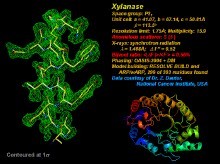Hongyu Chen, Shihai Zhang, Sung Woo Kim

Forty pigs [10.7 ± 1.2 kg initial body weight (BW) at 6 wk of age] were used in a 21-d study to evaluate the effects of supplemental xylanase (Hostazym X 100, Huvepharma, Inc., Peachtree City, GA) in nursery diets on digesta viscosity, nutrient digestibility, health of the small intestine, and growth performance when supplemented with corn distillers’ dried grains with solubles (DDGS). Pigs were individually housed and randomly allotted to four treatments in a 2 × 2 factorial arrangement (n = 20/factor, 0% or 30% DDGS and 0 or 1,500 endo-pentosanase unit/kg xylanase as two factors) based on sex and initial BW. Feed intake and BW were recorded weekly. On day 15 of the study, TiO2 in diets (0.3%) was used as an indigestible marker to calculate apparent ileal digestibility (AID). Plasma samples were collected on day 19 to measure tumor necrosis factor-alpha (TNF-α), malondialdehyde, and peptide YY. On day 21, all pigs were euthanized to collect tissues from duodenum, jejunum, and colon to measure morphology, TNF-α, and malondialdehyde concentrations. Distal jejunal digesta were collected to measure viscosity. Ileum digesta were collected to measure AID of nutrients. During the entire period, supplemental xylanase increased (P < 0.05) average daily gain (ADG; 616 to 660 g/d) of nursery pigs, whereas DDGS (0 or 30%) did not affect ADG. On week 3, average daily feed intake (ADFI) was increased (P < 0.05) when fed DDGS (1,141 to 1,267 g/d) and there was an interaction (P < 0.05) between two factors indicating that supplemental xylanase decreased ADFI when DDGS was used in a diet. Use of DDGS increased (P < 0.05) viscosity [1.86 to 2.38 centipoise (cP)], whereas supplemental xylanase reduced (P < 0.05) viscosity (2.27 to 1.96 cP) of jejunal digesta. The AID of dry matter (DM) and gross energy (GE) were improved (P < 0.05) by supplemental xylanase. Plasma TNF-α was decreased (P < 0.05, 108.5 to 69.9 pg/mL) by supplemental xylanase. Use of DDGS reduced (P < 0.05) villus height:crypt depth ratio (1.46 to 1.27), whereas supplemental xylanase increased (P < 0.05) the crypt depth (360 to 404 µm) in duodenum. In conclusion, feeding a diet with 30% DDGS to nursery pigs for 3 wk had no negative effect on growth performance, whereas reduced AID of DM and GE, increased TNF-α level in colon tissue, and reduced the ratio of villus height to crypt depth. Dietary supplementation of xylanase reduced digesta viscosity improving AID of nutrients, reduced inflammatory response, and altered intestinal morphology, collectively improving ADG of nursery pigs regardless of the use of DDGS in a diet.
2020. J. Anim. Sci. 98(6): skaa185
DOI:https://doi.org/10.1093/jas/skaa185
Registration hotline: 021-57634675
fax: 021-57632800
Copy right : 上海亘泰实业集团
Collaboration & Sponsorship: 021-57634938 57631012
ASASHotline:021-67868428
Site Map | CNZZStatistics
address:Shanghai songjiang jiuting town nine new highway 90 lane 3 nine new commercial building 15 floor

WeChat ID:asaschina
The pig nutrition international BBS CSIS